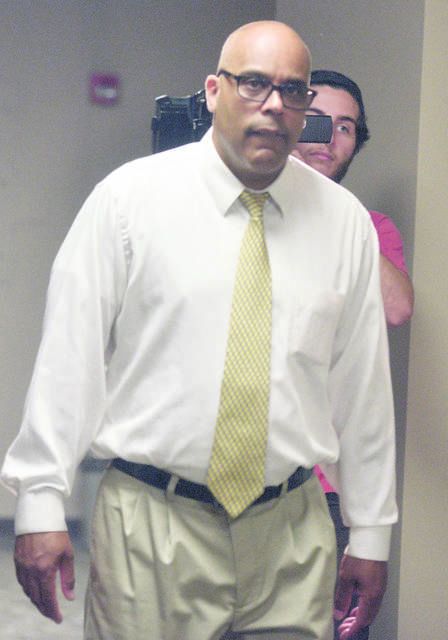Click here to subscribe today or Login.
WILKES-BARRE TWP. — After a day of testimony that was dominated by the defendant himself, the defense team for former Wilkes-Barre cop Robert Collins rested its case on Thursday.
During his testimony, Collins flatly denied the allegations of rape that were made by several women against him.
Collins, 55, of Wright Township, has been on trial this week, facing three dozen counts related to allegations he used his position to force sex on seven different female accusers.
But through Collins’ testimony on Thursday, the defense team attempted to simultaneously depict him as a dedicated officer and suggest that the incidents simply could not have happened the way the accusers suggested.
Collins’ attorney, Paul Walker, asked Collins questions about his path that led to his years at the Wilkes-Barre Police Department; Collins spent a few years in the U.S. Army before working in a series of factories, then eventually ending up at the U.S. Postal Service before deciding to apply to become an officer in his early 40s. He said he was looking to make a positive impact on the community he grew up in.
“I wanted to make a difference in my community,” Collins said. “Being a police officer can touch a lot of people.”
On the stand, Collins touted his arrest record, claiming he led the department in arrests in many of the years he was employed by the department.
“I was an aggressive police officer,” he said. “What I did was went out there and gave the city of Wilkes-Barre what they paid me to do.”
From there, Collins and Walker began to try to pick apart the stories that the alleged victims gave on the stand throughout the week.
One of the women claimed Collins forcibly inserted his fingers inside of her while giving her a ride home from the police station after she was booked for stealing items from Rite Aid. The woman said on the stand that Collins vouched for her after she gave the arresting officer a fake name before eventually taking advantage of her.
But Collins suggested that the story simply wouldn’t work, as the woman claimed the assault occurred in a police car in the area of GAR Memorial High School in the afternoon, and Collins said it would be an area with plenty of foot traffic.
For other claims, Walker showed Collins’ work schedule for the rough times the women claimed the incidents occurred, with the defense team suggesting the schedule shows Collins worked the day shift while nearly all of the women claimed the offenses occurred and night.
And for others, Collins flatly denied ever having met the women at all. He did say he had previously arrested two of them, though, but denied any improprieties.
Walker also called numerous character witnesses for Collins, including former city Police Chief Marcella Lendacky, who said that Collins had a positive reputation in the community.
“In fact, when Bob did a job, he did a good job,” Lendacky said of Collins, before Senior Deputy Attorney General Bernard Anderson objected to the answer, as Lendacky could only testify to Collins’ reputation and not her own perception of him.
Proceedings continue Friday morning, presumably with closing arguments and then jury deliberation.





